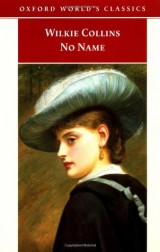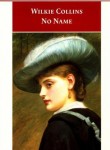August 25, 2020
 This is our final Cocktail Talk from Wilkie Collins’ dandy (if long, as a warning – not a scary warning, but just a “know what you’re getting into” warning – book) No Name. If you haven’t read the No Name Part I Cocktail Talk or the No Name Part II Cocktail Talk, I strongly suggest, in an amiable way, that you do, just to get more background on the book, learn about monks drinking grog and whiskey-swilling carriage drivers, and feel your day is complete. Also, those two follow the more traditional Spiked Punch Cocktail Talk style, in that they actually talk about drinks, spirits, booze, and all of that. WHAT! I can hear you say. “How can the below quote be a Cocktail Talk, without, well, cocktails (or such) in it?” Well, it is my site, but instead of belaboring that point, let me site precedence, in a past Cocktail Talk from one of Collins’ bosom buddies (in the main, though authors can be cranky, am I right?), Charles Dickens. Specifically, the Dombey and Son, Part IV Cocktail Talk, which is about one of my (which is saying a lot), maybe my all-time (which would really be saying a lot) Dickens’ characters, Diogenes the dog. And the below No Name Cocktail Talk is about dogs, too, in this case two dogs. Brutus and Cassius. They aren’t at Diogenes’ level – only some dogs are! – but they are good dogs, and this scene of their owner Admiral Bartram at dinner (being served by the books heroine – in disguise! – Magdalen) is charming. So, forgive the lack of booze below, but enjoy the abundance of pups.
This is our final Cocktail Talk from Wilkie Collins’ dandy (if long, as a warning – not a scary warning, but just a “know what you’re getting into” warning – book) No Name. If you haven’t read the No Name Part I Cocktail Talk or the No Name Part II Cocktail Talk, I strongly suggest, in an amiable way, that you do, just to get more background on the book, learn about monks drinking grog and whiskey-swilling carriage drivers, and feel your day is complete. Also, those two follow the more traditional Spiked Punch Cocktail Talk style, in that they actually talk about drinks, spirits, booze, and all of that. WHAT! I can hear you say. “How can the below quote be a Cocktail Talk, without, well, cocktails (or such) in it?” Well, it is my site, but instead of belaboring that point, let me site precedence, in a past Cocktail Talk from one of Collins’ bosom buddies (in the main, though authors can be cranky, am I right?), Charles Dickens. Specifically, the Dombey and Son, Part IV Cocktail Talk, which is about one of my (which is saying a lot), maybe my all-time (which would really be saying a lot) Dickens’ characters, Diogenes the dog. And the below No Name Cocktail Talk is about dogs, too, in this case two dogs. Brutus and Cassius. They aren’t at Diogenes’ level – only some dogs are! – but they are good dogs, and this scene of their owner Admiral Bartram at dinner (being served by the books heroine – in disguise! – Magdalen) is charming. So, forgive the lack of booze below, but enjoy the abundance of pups.
The two magnificent dogs sat squatted on their haunches, with their great heads over the table, watching the progress of the meal, with the profoundest attention, but apparently expecting no share in it. The roast meat was removed, the admiral’s plate was changed, and Magdalen took the silver covers off the two made-dishes on either side of the table. As she handed the first of the savory dishes to her master, the dogs suddenly exhibited a breathless personal interest in the proceedings. Brutus gluttonously watered at the mouth; and the tongue of Cassius, protruding in unutterable expectation, smoked again between his enormous jaws.
The admiral helped himself liberally from the dish; sent Magdalen to the side-table to get him some bread; and, when he thought her eye was off him, furtively tumbled the whole contents of his plate into Brutus’s mouth. Cassius whined faintly as his fortunate comrade swallowed the savory mess at a gulp. “Hush! you fool,” whispered the admiral. “Your turn next!”
Magdalen presented the second dish. Once more the old gentleman helped himself largely – once more he sent her away to the side-table, once more he tumbled the entire contents of the plate down the dog’s throat, selecting Cassius this time, as became a considerate master and an impartial man. When the next course followed – consisting of a plain pudding and an unwholesome “cream” – Magdalen’s suspicion of the function of the dogs at the dinner-table was confirmed. While the master took the simple pudding, the dogs swallowed the elaborate cream. The admiral was plainly afraid of offending his cook on the one hand, and of offending his digestion on the other – and Brutus and Cassius were the two trained accomplices who regularly helped him every day off the horns of his dilemma. “Very good! very good!” said the old gentleman, with the most transparent duplicity. “Tell the cook, my dear, a capital cream!”
–Wilkie Collins, No Name
August 18, 2020
 We are back for more Cocktail Talking from 1800s writer Wilkie Collins’ lesser-known gem No Name. If you haven’t read the No Name Part I Cocktail Talk, then I strongly suggest you do, to get a little background on the book, and the author (and if you really want to go into history, of a slightly less recent sort, but far more recent than the author himself, check out another Wilkie via The Yellow Mask and Other Stories Cocktail Talk). Did all that? Fan-Victorian-tastic! In this, our second No Name treat, our heroine Magdalen Vanstone is (in disguise – just letting you know that to be intriguing!) getting a tour of a house from one of its occupants, the charming (and tipsy) old sailor Mazey, who is a well-done memorable character, especially when he’s talking about monks drinking grog!
We are back for more Cocktail Talking from 1800s writer Wilkie Collins’ lesser-known gem No Name. If you haven’t read the No Name Part I Cocktail Talk, then I strongly suggest you do, to get a little background on the book, and the author (and if you really want to go into history, of a slightly less recent sort, but far more recent than the author himself, check out another Wilkie via The Yellow Mask and Other Stories Cocktail Talk). Did all that? Fan-Victorian-tastic! In this, our second No Name treat, our heroine Magdalen Vanstone is (in disguise – just letting you know that to be intriguing!) getting a tour of a house from one of its occupants, the charming (and tipsy) old sailor Mazey, who is a well-done memorable character, especially when he’s talking about monks drinking grog!
“No more, my dear — we’ve run aground here, and we may as well wear round and put back again,” said old Mazey. “There’s another side of the house — due south of you as you stand now — which is all tumbling about our ears. You must go out into the garden if you want to see it; it’s built off from us by a brick bulkhead, t’other side of this wall here. The monks lived due south of us, my dear, hundreds of years afore his honor the admiral was born or thought of, and a fine time of it they had, as I’ve heard. They sang in the church all the morning, and drank grog in the orchard all the afternoon. They slept off their grog on the best of feather-beds, and they fattened on the neighborhood all the year round. Lucky beggars! lucky beggars!”
–Wilkie Collins, No Name
August 11, 2020
 First published in serial form in 1862/1863, No Name is not the book name (see what I did there!) that first pops up when one thinks of Mr. Wilkie Collins; instead, it’s The Moonstone, and then The Woman in White. Both of which have also had recent television adaptions. It makes some sense, too, especially as The Moonstone is in many ways arguably (gently, cause there is no need for a ruckus) the first, or one of the first, detective novels, kicking off a massive industry, and The Woman in White has a little of that action, too. However! Collins wrote many more novels, some good, some not as good, and strongly in the good column is No Name. It had been, maybe, twenty-odd years since I read this the first time, and on the second reading recently I was struck by just how good it is, and left wondering why more haven’t taken it up. It has, as you might expect, a fair dollop of Victorian melodramatics – meaning, lots of cliff’s edges or “oh that didn’t happen” ramped up moments, like a silent movie in a way, or like a fair amount of modern movies now that I think about it – and gets wordy at over 500 pages. But the story/stories of two sisters (Magdalen and Norah Vanstone) abandoned when their parents die, and left none of their inheritance due to the ridiculous legality of the times, and how they deal with it and the loss of standing and fortune (not to mention grief, degradation, all that) is done quite well, and gives us a heroine (Magdalen) that many readers at the time weren’t fond of, but which I quite liked in her “do whatever it takes” and “I’m not going to sit in a place others tell me to” attitude. It could, I think, also make a swell miniseries! Plus, it was Collins’ pal Charles Dickens favorite (of the Collins canon), and has a couple nearly Dickensian characters, including the rascally Captain Wragge, and his nemesis, the calculating Mrs. Lecount, who below gives us – along with cruel fool Noah Vanstone – our first of three Cocktail Talks from the book.
First published in serial form in 1862/1863, No Name is not the book name (see what I did there!) that first pops up when one thinks of Mr. Wilkie Collins; instead, it’s The Moonstone, and then The Woman in White. Both of which have also had recent television adaptions. It makes some sense, too, especially as The Moonstone is in many ways arguably (gently, cause there is no need for a ruckus) the first, or one of the first, detective novels, kicking off a massive industry, and The Woman in White has a little of that action, too. However! Collins wrote many more novels, some good, some not as good, and strongly in the good column is No Name. It had been, maybe, twenty-odd years since I read this the first time, and on the second reading recently I was struck by just how good it is, and left wondering why more haven’t taken it up. It has, as you might expect, a fair dollop of Victorian melodramatics – meaning, lots of cliff’s edges or “oh that didn’t happen” ramped up moments, like a silent movie in a way, or like a fair amount of modern movies now that I think about it – and gets wordy at over 500 pages. But the story/stories of two sisters (Magdalen and Norah Vanstone) abandoned when their parents die, and left none of their inheritance due to the ridiculous legality of the times, and how they deal with it and the loss of standing and fortune (not to mention grief, degradation, all that) is done quite well, and gives us a heroine (Magdalen) that many readers at the time weren’t fond of, but which I quite liked in her “do whatever it takes” and “I’m not going to sit in a place others tell me to” attitude. It could, I think, also make a swell miniseries! Plus, it was Collins’ pal Charles Dickens favorite (of the Collins canon), and has a couple nearly Dickensian characters, including the rascally Captain Wragge, and his nemesis, the calculating Mrs. Lecount, who below gives us – along with cruel fool Noah Vanstone – our first of three Cocktail Talks from the book.
“The man has been drinking, sir,” said Mrs. Lecount. “It is easy to see and to smell that. But he is evidently used to drinking. If he is sober enough to walk quite straight–which he certainly does–and to sign his name in an excellent handwriting–which you may see for yourself on the Will–I venture to think he is sober enough to drive us to Dumfries.”
“Nothing of the sort! You’re a foreigner, Lecount; you don’t understand these people. They drink whisky from morning to night. Whisky is the strongest spirit that’s made; whisky is notorious for its effect on the brain. I tell you, I won’t run the risk. I never was driven, and I never will be driven, by anybody but a sober man.”
–Wilkie Collins, No Name
 This is our final Cocktail Talk from Wilkie Collins’ dandy (if long, as a warning – not a scary warning, but just a “know what you’re getting into” warning – book) No Name. If you haven’t read the No Name Part I Cocktail Talk or the No Name Part II Cocktail Talk, I strongly suggest, in an amiable way, that you do, just to get more background on the book, learn about monks drinking grog and whiskey-swilling carriage drivers, and feel your day is complete. Also, those two follow the more traditional Spiked Punch Cocktail Talk style, in that they actually talk about drinks, spirits, booze, and all of that. WHAT! I can hear you say. “How can the below quote be a Cocktail Talk, without, well, cocktails (or such) in it?” Well, it is my site, but instead of belaboring that point, let me site precedence, in a past Cocktail Talk from one of Collins’ bosom buddies (in the main, though authors can be cranky, am I right?), Charles Dickens. Specifically, the Dombey and Son, Part IV Cocktail Talk, which is about one of my (which is saying a lot), maybe my all-time (which would really be saying a lot) Dickens’ characters, Diogenes the dog. And the below No Name Cocktail Talk is about dogs, too, in this case two dogs. Brutus and Cassius. They aren’t at Diogenes’ level – only some dogs are! – but they are good dogs, and this scene of their owner Admiral Bartram at dinner (being served by the books heroine – in disguise! – Magdalen) is charming. So, forgive the lack of booze below, but enjoy the abundance of pups.
This is our final Cocktail Talk from Wilkie Collins’ dandy (if long, as a warning – not a scary warning, but just a “know what you’re getting into” warning – book) No Name. If you haven’t read the No Name Part I Cocktail Talk or the No Name Part II Cocktail Talk, I strongly suggest, in an amiable way, that you do, just to get more background on the book, learn about monks drinking grog and whiskey-swilling carriage drivers, and feel your day is complete. Also, those two follow the more traditional Spiked Punch Cocktail Talk style, in that they actually talk about drinks, spirits, booze, and all of that. WHAT! I can hear you say. “How can the below quote be a Cocktail Talk, without, well, cocktails (or such) in it?” Well, it is my site, but instead of belaboring that point, let me site precedence, in a past Cocktail Talk from one of Collins’ bosom buddies (in the main, though authors can be cranky, am I right?), Charles Dickens. Specifically, the Dombey and Son, Part IV Cocktail Talk, which is about one of my (which is saying a lot), maybe my all-time (which would really be saying a lot) Dickens’ characters, Diogenes the dog. And the below No Name Cocktail Talk is about dogs, too, in this case two dogs. Brutus and Cassius. They aren’t at Diogenes’ level – only some dogs are! – but they are good dogs, and this scene of their owner Admiral Bartram at dinner (being served by the books heroine – in disguise! – Magdalen) is charming. So, forgive the lack of booze below, but enjoy the abundance of pups.





















